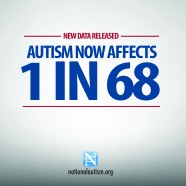Link: http://nationalautismassociation.org/autism-now-affects-1-in-68-children-1-in-42-boys/
Autism now affects 1 in 68 children; 1 in 42 boys

Autism Groups React to New CDC-Reported Prevalence of 1 in 68 Children
AUTISM POLICY REFORM COALITION URGES GOVERNMENT EXAMINATION OF ENVIRONMENTAL CAUSES, AND FOCUS ON TREATMENT AND SERVICES
WASHINGTON, DC (March 27, 2014)—Today, the U.S. Centers for Disease Control and Prevention issued the newest autism prevalence statistics. For children born in 2002, the prevalence of autism was 1 in 68; 1 in 42 boys. Almost 60,000 US 12 year-olds likely have autism. Thirty years ago, autism affected 1 in 2,500 children; there has been a 37-fold increase.Katie Weisman of SafeMinds stated, “Broader criteria and awareness cannot account for this magnitude of increase. The federal government continues to spend millions of dollars ineffectively and ‘potentially duplicatively’ according to a recent GAO report. We need to identify environmental triggers for autism, prevent them, and develop effective treatments.”
Holly Bortfeld of TACA stated, “The federal government has spent $1.6 billion on autism since 2006, but the money is not helping those affected in meaningful ways. We need to improve medical treatment for the many co-occuring health concerns of individuals with autism and address the wave of students who are aging out and entering an adult world with no plan for them. ”
The Autism Policy Reform Coalition (APRC) is advocating for changes in the U.S. Government’s response to the autism crisis and represents a constituency of over 100,000. The APRC is calling for significant changes in the Combating Autism Act, which is to be reauthorized by Congress this year.
“Since 2011, 44 U.S. children with autism have died after wandering away from a safe environment,” stated National Autism Association President Wendy Fournier. ”Our federal government must recognize these deaths, and the urgent needs of our most profoundly affected population. They suffer silently in pain from untreated medical issues; they are abused, bullied, and may be at increased risk of suicide. Their deaths and injuries are preventable through an appropriate federal response, which our coalition is dedicated to securing.”
###
The AUTISM POLICY REFORM COALITION includes: Autism is Medical, Defending Academic Integrity and Research Foundation, Generation Rescue, National Autism Association, SafeMinds, Talk About Curing Autism, and The Thinking Mom’s Revolution. Its mission is to educate public officials and to encourage legislation that will make a measurable difference in the lives of the persons with autism and their families.To view the report in it’s entirety, click here.


